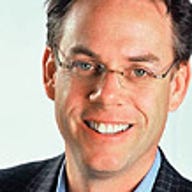Success: Three big myths

 Garrison Wynn believes that the top 1% aren’t any smarter. They just have a secret advantage. In his new book, “The Real Truth About Success: What the Top 1% Do Differently, Why They Won’t Tell You, and How You Can Do It Anyway!” Wynn makes his case. Here on Smart Planet Garrison recently shared success tips for us to consider in the year ahead. Today I’ve asked him back to share a little more about the top 1% and the big myths that many fall for.
Garrison Wynn believes that the top 1% aren’t any smarter. They just have a secret advantage. In his new book, “The Real Truth About Success: What the Top 1% Do Differently, Why They Won’t Tell You, and How You Can Do It Anyway!” Wynn makes his case. Here on Smart Planet Garrison recently shared success tips for us to consider in the year ahead. Today I’ve asked him back to share a little more about the top 1% and the big myths that many fall for.
Welcome back Garrison, are the top 1% any better than everyone else? Do they have more skills?
In our research we found that top performers in general are nothing more than average businesspeople who have discovered their secret advantage and leveraged it to reach new heights. We learned that success often comes to the average person who's not a standout in terms of skills or knowledge. … Now, I know that’s an unconventional thought. It goes against all we've been taught. It seems unfair because we think the best man always wins, right?
Wrong! Something as simple as a personal edge can boost you to success. It’s just that we often look right past our personal advantages because we’ve been conditioned to believe certain lies or myths about success.
Can we dive into these myths?
Sure, because understanding them is pretty important groundwork if you ultimately hope to move past them to learn the truth about success.
Myth No. 1: The power of positive thinking propels you to success
This myth says that to be successful, it's most important to believe you can succeed. That sounds great … except that when you talk to people who are tremendously successful, you learn they did more than just believe: They thought negatively. Many professionals have reached the top of their industry because an undercurrent of their own negativity helped them to avoid being blindsided. It helped them prepare for circumstances that could block their progress. They looked ahead to see what obstacles they'd have to kick to the curb. As a result, they didn't hit many roadblocks they hadn't anticipated or planned for.
Now, I'm not saying there's anything wrong with optimism. Honestly, optimists are far more fun to be around. I'm suggesting that the faster track to success is peppered with pessimism. When it comes to success, people who see a glass half empty are more likely to fill up the glass than people who see it half full.
Myth No. 2: To have greater influence, what you have to offer must be bigger, better, more advanced, or greatly enhanced to surpass the competition
This idea hinges on the flawed premise that the best product always wins. Experience tells a different story: People will choose a mediocre product over a good one, as long as it fills a need.
McDonald's sells the most hamburgers in the world – but are they the best hamburgers in the world? In this case, mediocrity prevails because the world's largest fast-food franchise fills modern man's two great needs: fast and food. McDonald's is convenient, familiar, and pervasive. We've grown comfortable with it, so it wins our business. That’s because people rarely seek out or choose the best. Instead, they choose what makes them comfortable, whether it's the best or not.
Myth No. 3: Genius is the foundation of success
Again, this belief relies on the misconception that the best always comes out on top. So, surely the smartest people must be destined for greatness. But smart is not synonymous with successful. The most intelligent, most highly educated person in the company typically is not the CEO; it's the little-known guy with his name embroidered on his lab coat. He may be the smartest person in the room, but he has the least amount of influence because people just don't know what he's talking about. That's why the smartest people rarely run the company. It's also why if your name is on your shirt, you're probably not the boss.
You talk about genius. How do we find our own unique genius?
Well, again, “genius” in its strictest sense does not guarantee success. In fact, lots of tremendously successful people have IQs in the average range. Abraham Lincoln and Britney Spears have the same IQ. And Andy Warhol’s IQ was 86! And Warren Buffet just keeps telling people he does not invest in things he does not understand (which seems to be quite a bit).
So finding your own unique “genius,” as that relates to my research, is not necessarily a matter of intelligence. It’s more accurate to say it’s a matter of self-intelligence. It’s a matter of knowing your strengths and understanding how other people perceive you. If you can do that, you have a huge advantage.
Thanks Garrison!
Learn more about Garrison's Book
Consider Garrison as a your next Keynote Speaker
This post was originally published on Smartplanet.com